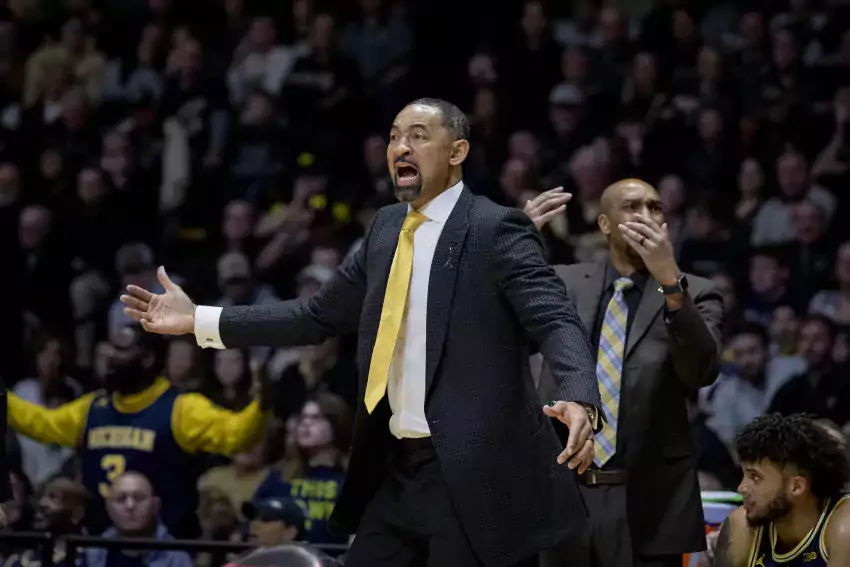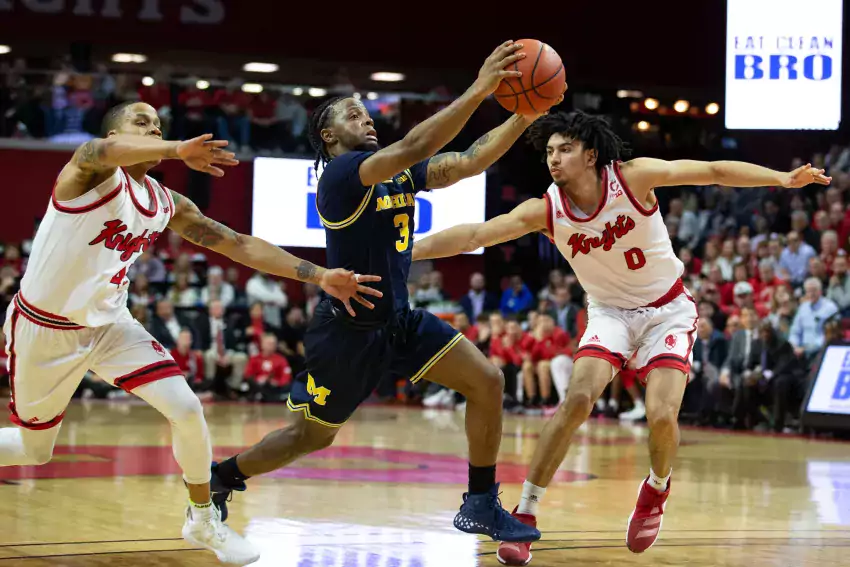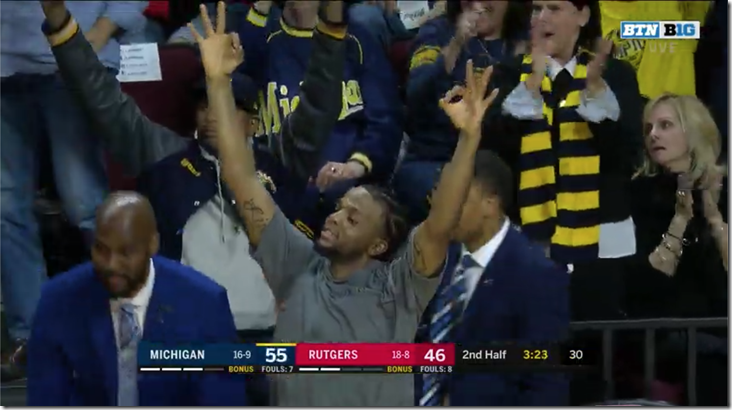juwan howard knows everyone

Let's dive back in to more of your questions, starting with what makes for a successful coach.
Hi Ace,
Curious on your thoughts on what the most important aspects to being a great college coach are (e.g. 40% recruiting/roster management, 30% team management, 20% PR/face of program, 10% scheme/Xs-and-Os, etc), and how you'd grade Howard's first season along those lines, as well as a prognosis going forward.
Best,
Mike
I'll preface with this: there's a lot more than one way to be a highly successful college coach. Recruiting at a high level can cover for shortcomings as a strategist. A strong player development program can make up for recruiting lesser talent than your peers. John Beilein and Larry Brown have (officially) made the same number of Final Fours. Same goes for Bill Self and Jay Wright. These coaches aren't similar in on- or off-court approach but they've fit at their respective schools, which is arguably the most important factor.
If I had to break it down into categories, they'd be: fit with school/administration, recruiting/image, roster management, player development, scheme, and game management. While an elite college coach doesn't have to be great at every one of these factors, they usually check off most of the boxes.
It's early yet to be able to judge Juwan Howard on some of these. A quick stab at grades:
Fit with school/administration: A. I'm assuming the readers of this post are familiar with Juwan Howard, former All-American at Michigan, basketball lifer, and universally regarded good dude. It's hard to overstate how fortunate the program was that such a tight fit was available despite the late timing of John Beilein's departure.
Recruiting/image: A. Howard is the face of the program, his first recruiting class ranks fourth in the country, and he could still add a second five-star to that group. This moves up to an A+ if Josh Christopher commits—it'd be difficult to imagine a better start after Howard had to hit the ground running with a 2020 class that needed more commits than usual.
Roster management: Incomplete. We'll learn more about Howard's ability to juggle a roster this offseason. He appears prepared for unexpected attrition with Michigan's pursuit of multiple grad transfer point guards even though the team is full for the moment after scratching Austin Davis and Adrien Nunez off the potential attrition list.
Beilein learned the hard way that great programs lose players at a steady rate to both the NBA and programs where even established rotation players can find more playing time; it took him a while to adjust and he still got caught off-guard by last year's early entry decisions by Jordan Poole and Iggy Brazdeikis. Howard seems to know how the game is played and his experience as both a former elite player and the father of high-level prospects should serve him well.
Player development: Incomplete. The unexpected breakout of Austin Davis indicates Howard at least should be good at getting the most out of his big men. That said, it's way too early to put a grade on his player development. This is something to revisit a year or three down the road.
Scheme: B+. I really like the framework. Howard didn't stand pat with John Beilein's offense despite having his pick-and-roll duo as seniors, instead building around the ball screen offense with plenty of NBA sets and added wrinkles. The defensive philosophy was also clear: play man defense with the occasional zone changeup (almost always after a timeout), use drop pick-and-roll coverage when possible, run shooters off the arc, and force players to beat you one-on-one.
I need to see more to move the grade any higher, especially since he could build so much off the Simpson/Teske pick-and-roll—we'll get a clearer view of how Howard wants to operate as he molds the roster to his preference instead of working with another coach's players.
Game management: B-. The area I most want to see improvement. Howard made some strange lineup decisions during the season that were usually borne of his strong adherence to the hated autobench policy. His best schematic adjustments often came either between games against the same opponent (see: hedging Cassius Winston and leaving Xavier Tillman to shoot in the second MSU game) or too late in the game to alter the outcome (see: playing Brandon Johns at center against Wisconsin).
I wouldn't say Howard was bad at game management by any stretch. He had to work within some serious limitations when Franz Wagner and Isaiah Livers were absent for significant stretches of time. He utilized timeouts well on both ends, drawing up effective plays and using that zone changeup to flummox offenses running a set to beat man. I would've loved to see him in a postseason tournament setting this year. Alas.
[Hit THE JUMP for what I'm missing most about the tournament, what next year's offense could look like, and more.]

2/19/2020 – Michigan 60, Rutgers 52 – 17-9, 8-7 Big Ten
It was weird seeing Jalen Rose directly behind the Michigan bench last night. It was weirder when Eli Brooks hit a cold-blooded three after getting stuck with a late clock possession against a 6'7" guy. The camera cut to the bench, where Zavier Simpson and Rose were doing the same thing:
This is a synthesis of two different Michigan pasts, its present, and its future.
One of the two pasts is offscreen: it's Brooks canning the three. Brooks is the most Beilein kid on Michigan's current roster. He's utterly devoid of swag. He remembers things after you tell him. He plays relentless positional defense in the manner of a guy determined to overcome limitations. He shoots from distance; the rim is a rumor unless the opposition has gotten beaten by one of Michigan's sets.
He feels like a mid-major player who got bumped up by circumstance. Eli Brooks is Zack Novak and Stu Douglass and the progression of guys who are just making it work against all athletic odds. Maybe not the most common Beilein architype, but the most Beilein archetype.
The other past is obvious, with apologies to Chris Hunter: Jalen freakin' Rose. Fab Five guy. Decade-long NBA career. Now paid to be interesting in public. The Fab Five was larger than life and Rose was always the guy with the mic. Your author had some problems with Rose in the Beilein era because he didn't seem to care about the program at all until it made the Final Four, and then that was just an opportunity to talk about how rad the Fab Five was.
To be clear, Rose has every reason to be bitter about how Michigan treated him and his classmates for close to 20 years. hat bitterness could only increase as the idea that paying basketball players was immoral was repudiated by ever more important components of the college basketball ecosystem. First bloggers, then sportswriters, then coaches, and finally the NCAA itself. For Michigan's banners to stay down while Will Wade and Bill Self keep their jobs after being definitively proven as violators by the FBI (the FBI!)… well, if that was me I'd probably be pretty distant too.
But he's back, and he's hanging on Eli Brooks. Hanging.
-------------------------
The present is Zavier Simpson, who's only on the bench in the shot above because he's got four fouls and Michigan's buying him a couple minutes. Aside from this brief period he barely comes off the floor, leads Michigan in scoring, and is robbed of a double-digit assist game by Michigan's erratic three-point shooting.
Simpson is the exact opposite of a Beilein archetype, brought in as a no-shoot all-D point guard. He's beaten himself into a progressively better player over the course of four years. He's not a Beilein creation or a Juwan Howard creation. He is always becoming himself with no outside intervention except from maybe dad. He scores his 1,000th point in this game on a hook shot he and only he uses.
It didn't matter whether Beilein stayed or not. There was never going to be another Zavier Simpson. Juwan Howard won't recruit anyone like him; John Beilein wouldn't have. That's because there are no other players like Zavier Simpson. He is sui generis.
----------------------------------
To get to the future you gotta put it all together. Brooks is 0/5 in this game at the suddenly impregnable RAC. This space repeatedly wondered whether he had a mental block against high level teams, and thought David DeJulius should start eating to his minutes. Juwan Howard didn't, and Juwan Howard was right, and Eli Brooks just hit the iciest shot of his career.
Jalen Rose is there, a couple games after Dikembe Mutumbo and Worldwide Wes were at Welsh-Ryan, of all places. Juwan Howard knows everyone and everyone likes him. Michigan's tendency towards factionalism could easily rise up in the aftermath of losing the best coach in program history, but it won't because everyone wants Juwan Howard to succeed from Lebron James on down.
Zavier Simpson is there. Juwan Howard has gotten out of Simpson's way and let him have his team.
It's really hard to get everyone pulling in one direction. Everyone reading this knows that in their bones. In Juwan Howard it seems like Michigan's found a guy who can pull up the guys who need it, leave the guys who don't alone, and gather everyone to him, past, present, and future.
[After THE JUMP: the new disaster artist]

2/12/2020 – Michigan 79, Northwestern 54 – 15-9, 6-7 Big Ten
I remember Julia Louis-Dreyfus. I remember a packed arena losing its mind for Dererk Pardon on that thing he did, you know, that one. I remember worse Northwestern teams that didn't sniff the tournament but were still close enough to turn Chris Collins into a dog.
Playing Northwestern anywhere other than Crisler has been a brutally frustrating experience for Michigan of late. Michigan won 62-60 in Northwestern's building just last year. The year before the Wildcats won; the year before that was the Pardon thing. There was no game at Welsh-Ryan in 2016; instead Michigan scraped out an OT win in the Big Ten Tournament.
A distinct air of "here we go again" descended over the Michigan fandom during a nearly six minute stretch without points immediately after tipoff. Then Northwestern gave up a 31-5 run with Zavier Simpson on the bench. In the second half there were possessions were Simpson just threw it to Brooks or Livers for wide open threes. No action, no screens, just guys standing by themselves outside the three point line.
It took Northwestern over a half to get an offensive rebound. Jared Jones, the backup post you may remember canning off the dribble jumpers, seemed like the only guy on the court who wanted to be there. It obviously sucks to be on a team that's 1-12 in conference play but after watching Rutgers nearly fight all the way back against Ohio State in the game immediately preceding Michigan's it was hard not to compare the two teams.
Rutgers is still pretty much Rutgers. They can't shoot (318th in 3P%, 329th in FT%). Their offense is still a series of isos with very little team basketball (311th in assist rate). They're an island of misfit toys, and they play balls to the wall at all times. It's impossible to rattle them. They play in the RAC. Two years ago they went 3-15 in league play. So what if Geo Baker misses 12 straight shots and you're down 15 to, yep, Northwestern? Been there. Lived there. Gonna win anyway in the jankiest way possible.
Northwestern just wants to go home.
[After THE JUMP: Big Country!]

26